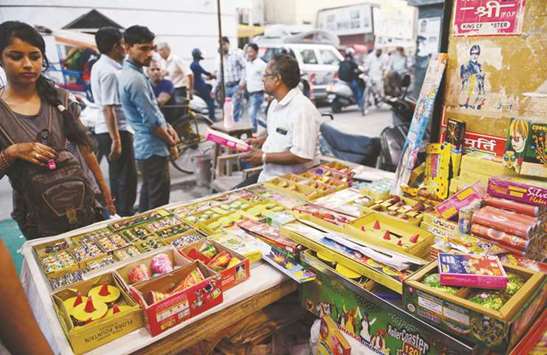The Supreme Court yesterday temporarily banned the sale of firecrackers in and around the capital ahead of Diwali, the festival of lights, as it looks to prevent a repeat of severe air pollution that forced school closures last year.
New Delhi’s air quality has hit “very unhealthy” levels, US Embassy data shows.
This is often blamed on burning of unwanted vegetation on farms in neighbouring states, usual at this time of year, worsened by fumes from fireworks.
The ban takes effect immediately and will run until November 1, said a panel of Supreme Court judges headed by Justice Arjan Kumar Sikri, adding its impact on the region’s air quality would have to be examined after the festival.
The judges said they wanted to see if there was an actual connection between air pollution and exploding fireworks on the night of Diwali.
Lawyers representing firework sellers had argued there was no such link.
“All temporary licences to sell firecrackers stand cancelled,” said Haripriya Padmanabhan, a lawyer representing the group that sought the ban.
“People who had already purchased crackers will be able to burst them. Hopefully they won’t do that,” she told Asian News International.
Diwali, traditionally ushered in with the setting off of firecrackers falls on October 19 this year.
The government welcomed the move, with Environment Minister Harsh Vardhan requesting people to abide by the order.
But others, including Priti Gandhi, a leader from Prime Minister Narendra Modi’s Bharatiya Janata Party, saw it as an attack on tradition and Hindu culture.
“We Indians will protest and burn crackers,” wrote one Twitter user, Ishkaran Bhandari.
“We will uphold our culture, traditions and celebrate Diwali.”
Last November, about a million children were forced to stay home from school, thousands of workers reported sick and queues formed outside shops selling face masks as New Delhi struggled with its worst pollution for nearly 20 years.
Vehicle emissions and dust from construction sites were the factors blamed for that spike, besides firecrackers and farm burnings.
Delhi traders said the order was a violation of their right to conduct business and would lead to “huge losses”.
“(The) possibility of people buying crackers from other states and bursting them in Delhi NCR (national capital region) cannot be ruled out,” the Confederation of All India Traders said in a statement.
“In such a case, Delhi traders will be in a disadvantageous position and will lose business to their counterparts in other states.”
Nights of bursting colour in the sky have become a fixture of the festival in the city and many Delhi residents are likely to bristle at the ban.
One popular Mumbai-based author, Chetan Bhagat, compared the ruling to “banning Christmas trees on Christmas”.
How strongly the sale ban will be enforced remains to be seen, though one seller, Anwar Ali, said he would grudgingly comply with the order.
“It’s a headache that isn’t going away,” he said of the decision, from his fireworks store in south Delhi.
“They say the firecrackers increase the pollution but I don’t believe that. All they do is kill mosquitoes.”
He said uncertainty over the legal status of fireworks had left the business he ran with his brothers Rs2.5m in debt and he was struggling to pay his children’s school fees.
Hundreds of people in his village, Swarupnagar, just outside Delhi were involved in manufacturing or selling firecrackers and would suffer without the traditional surge in Diwali sales, he added.
“The whole village survives on these firecrackers.”
India and China together account for more than half of the 4.2mn deaths attributable to air pollution worldwide in 2015, a study by the US-based Health Effects Institute (HEI) showed.
Global environmental group Greenpeace said the court ban on crackers was only a small relief for the “episodic air pollution levels in October”.

A woman looks on at a shop selling firecrackers in New Delhi yesterday. India’s top court ordered a temporary ban on the sale of firecrackers in the capital ahead of the Diwali festival that leaves the city shrouded in toxic smog.
